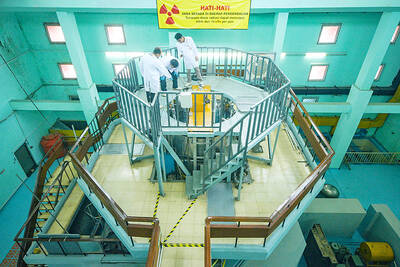Australian Prime Minister Kevin Rudd yesterday denied a report alleging that US President George W. Bush had asked him what the G20 was, amid mounting political tensions over the embarrassing story.
The newspaper report alleged that Rudd had pushed Bush for a summit of G20 countries during a telephone call about the global financial crisis on Oct. 10 and had been stunned when the US president had asked: “What’s the G20?”
The Weekend Australian report, which cited unnamed sources, said the phone call had occurred during a dinner party hosted by Rudd at his official residence in Sydney.
CALL
Rudd said he had phoned Bush to discuss the role of the G20, which brings together the world’s largest industrialized and emerging economies, in the crisis and stressed that the US leader had not been ignorant of the body.
“The president of the United States has consistently emphasized the importance of the G20 in response to the global financial crisis,” Rudd said.
“The purpose of my call to the president was specifically to discuss the role of the G20 … That was the explicit purpose of the call and the president did not make the remarks that have been attributed to him in the article in question.”
Rudd would not confirm whether the story came from his office.
“On the source of individual stories … there are multiple conversations with multiple people from political offices and elsewhere which leads to the construction of a story,” he said.
APOLOGIZE
Conservative opposition leader Malcolm Turnbull has called on Rudd to apologize to Bush for leaking details of the phone call.
The alleged exchange was leaked “in a way that was clearly authoritative, that clearly came from the prime minister’s office,” Turnbull said on Sunday.
Former foreign minister Alexander Downer, who served in the previous conservative government, has called for an investigation into the alleged leak.
The G20 will meet in Washington on Nov. 15 at Bush’s invitation to discuss the financial crisis and Rudd is expected to attend.

Four people jailed in the landmark Hong Kong national security trial of "47 democrats" accused of conspiracy to commit subversion were freed today after more than four years behind bars, the second group to be released in a month. Among those freed was long-time political and LGBTQ activist Jimmy Sham (岑子杰), who also led one of Hong Kong’s largest pro-democracy groups, the Civil Human Rights Front, which disbanded in 2021. "Let me spend some time with my family," Sham said after arriving at his home in the Kowloon district of Jordan. "I don’t know how to plan ahead because, to me, it feels

Poland is set to hold a presidential runoff election today between two candidates offering starkly different visions for the country’s future. The winner would succeed Polish President Andrzej Duda, a conservative who is finishing his second and final term. The outcome would determine whether Poland embraces a nationalist populist trajectory or pivots more fully toward liberal, pro-European policies. An exit poll by Ipsos would be released when polls close today at 9pm local time, with a margin of error of plus or minus 2 percentage points. Final results are expected tomorrow. Whoever wins can be expected to either help or hinder the

North Korea has detained another official over last week’s failed launch of a warship, which damaged the naval destroyer, state media reported yesterday. Pyongyang announced “a serious accident” at Wednesday last week’s launch ceremony, which crushed sections of the bottom of the new destroyer. North Korean leader Kim Jong-un called the mishap a “criminal act caused by absolute carelessness.” Ri Hyong-son, vice department director of the Munitions Industry Department of the Party Central Committee, was summoned and detained on Sunday, the Korean Central News Agency (KCNA) reported. He was “greatly responsible for the occurrence of the serious accident,” it said. Ri is the fourth person

SKEPTICAL: Given the challenges, which include waste disposal and potential domestic opposition, experts warn that the 2032 nuclear timeline is overambitious Indonesia is hoping going nuclear can help it meet soaring energy demand while taming emissions, but faces serious challenges to its goal of a first small modular reactor by 2032. Its first experiment with nuclear energy dates to February 1965, when then-Indonesian president Sukarno inaugurated a test reactor. Sixty years later, Southeast Asia’s largest economy has three research reactors, but no nuclear power plants for electricity. Abundant reserves of polluting coal have so far met the enormous archipelago’s energy needs, but “nuclear will be necessary to constrain the rise of and eventually reduce emissions,” said Philip Andrews-Speed, a senior research fellow at the